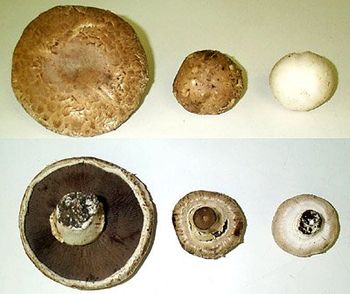Agaricus Bisporus
Other names : common mushroom, button mushroom, white mushroom, table mushroom, champignon mushroom, crimini mushroom, Swiss brown mushroom, Roman brown mushroom, Italian brown, Italian mushroom, cultivated mushroom, or when mature, the Portobello mushroom
See also : Agaricus
Special Precautions of Agaricus Bisporus
Agaricus bisporus is considered safe, non-toxic and well tolerated by the majority of the population, with a low risk of allergies. Like many mushrooms, Agaricus bisporus does contain levels of agaritine, which becomes the carcinogenic chemical hydrazine in the body. Cooking is recommended to prevent toxicity from these chemicals. When selecting wild mushrooms, it's essential to identify them properly, as the highly toxic mushroom known as "destroying angel," or Amanita, resembles Agaricus bisporus greatly in appearance and the two are easily confused.
The benefits of Agaricus Bisporus are
- Nutrition : Agaricus bisporus is a source of excellent nutrition, providing a range of vitamins, minerals, carbohydrates, protein and phytochemicals that are important for human health. Agaricus bisporus provide the minerals selenium, copper, potassium, iron and zinc, as well as a range of vitamins including thiamin, riboflavin, pantothenic acid, niacin and vitamins C and D. In a "Los Angeles Times" health article (March 31, 2008), Susan Bowerman reports that the minute amounts of vitamin D that Agaricus bisporus contains raises significantly when the mushrooms are exposed to brief pulses of UV light before or after harvesting. Mushrooms with a high vitamin D content turn brown and lose their characteristic white color -- their vitamin D content can rise to as high as 800 IU per serving.
- Immune Health : In addition to the nutritional benefits of this mushroom, it may have useful medicinal properties that support health and well-being. In a study published in "BMC Complementary and Alternative Medicine" in July 2011, researchers studied the effects of Agaricus bisporus on human immune cells in vitro. Agaricus bisporus significantly stimulated immune activity, specifically cytokines and enzymes that are responsible for inflammation. Researchers concluded the medicinal value of Agaricus bisporus was likely due to the carbohydrate-based chemicals called mannogalactans. While more clinical research is required to confirm these results, eating Agaricus bisporus regularly may have a health effect on your immune defenses.
- Cancer Prevention : In a study published in "The International Journal of Cancer" in March 2009, researchers from the University of Western Australia studied the effects of Agaricus bisporus on breast cancer. The study indicates that dietary mushrooms can reduce the risk of breast cancer in pre- and post-menopausal women significantly. Agaricus bisporus may prevent breast cancer through an aromatase-inhibiting action that reduces enzymes that increase estrogen levels and drive breast cancer growth, making the mushroom both hormone-balancing and chemo-preventative.
- Boost energy, eliminate fatigue, and balance the effects of stress
- Promote healthy skin and hair
- Cleanse the liver and flush out toxins
- Improve brain cell function and promote memory and concentration.
- immune booster : they boost the production of natural killer cells, which help defend against tumours and virus infection.
- Arteriosclerosis : mushrooms are high in an antioxidant that helps prevent plaque formation in arteries
